Search Results
161 content pages
Covid-19 Dental-Related Complications
The pandemic has had a monumental impact on a variety of aspects of life, and dental health is not an exception. Unfortunately, many people have reported symptoms associated with COVID-19 that have impacted their oral health. There are a variety of reasons why this can happen, but the most common reasons are due to the avoidance of seeking routine dental care during lockdown, as well as side-effects from prolonged mask wearing and pandemic-related stress.
What is Mask Mouth?
When wearing a mask has a negative impact on oral health, this is called mask mouth. Mask mouth develops due to a...

Pregnancy and Your Child's Developing Teeth
Your baby's teeth will not be visible at birth. But believe it or not, they already exist beneath the gums. Children's primary teeth begin forming at about the sixth week of pregnancy, and start mineralizing — building the bonelike inner tooth layer (called dentin) and the super-hard enamel layer that covers it — around the third or fourth month of pregnancy. So if you're pregnant, it's not too early to start thinking about how to make sure your child's teeth are as healthy as possible!
Like everything else having to do with your baby's physical development before birth, much depends...

Tooth Pain
The sensation of tooth pain — ranging from minor aching and sensitivity to acute distress — is something almost everyone has experienced at one time or another. In general, pain is a protective response from the body, telling you that something is wrong. But tooth pain can be troublesome because it's often hard to pinpoint exactly where it's coming from, and it may come and go in response to other stimuli — eating hot or cold foods, for example.
A few non-dental problems, such as sinus infections, cluster headaches, and certain diseases or drugs, can cause tooth pain. But by...
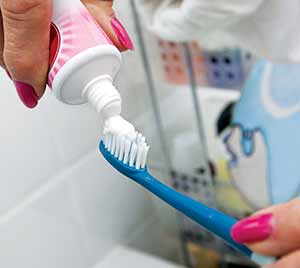
Fluoride and Your Teeth
Fluoride is a mineral that is naturally present to some degree in both fresh and salt water sources. Its major dental benefit is that it is readily incorporated into the teeth's mineral structure, thereby making them stronger and more decay-resistant. Fluoride can even reverse tiny cavities that are starting to form. Less tooth decay (professionally defined as “caries”) means you have a better chance of avoiding significant dental treatments — and keeping your natural teeth for life.
The great majority of toothpastes sold today contain fluoride, because it's an effective, easy and inexpensive way to prevent tooth decay and promote...
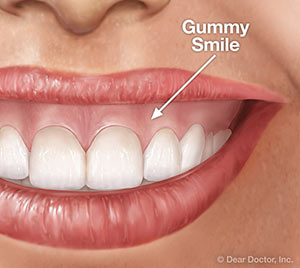
Gummy Smiles
Some people feel self-conscious about smiling because they believe their gums are too prominent. Though we each have our own definition of what makes a smile beautiful — including how much gum is too much — a smile will usually be perceived as “gummy” when 4 millimeters (just over an eighth of an inch) of gum tissue shows. If your smile looks gummy to you, it's important to figure out exactly what's causing this. Only then can the appropriate cosmetic dental or periodontal (gum) procedures be recommended to give you a more pleasing appearance of the gums and teeth.
Causes...
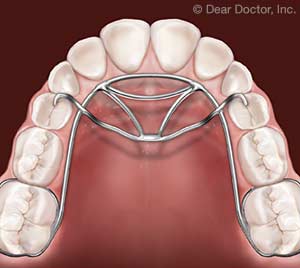
Thumb and Finger Appliances
Is there any image that illustrates the comforts of babyhood better than a sleepy infant sucking his or her thumb? Ultrasound pictures have shown, to the joy of many prospective parents, that this behavior can even occur in the womb. The thumb- or finger-sucking habit seems to relax and comfort toddlers too, and it's perfectly natural. But as a child grows, there comes a point where this habit isn't just socially awkward — it may also be harmful to his or her oral health.
In most children, thumb sucking stops on its own between the ages of two and four...

Oral Hygiene for Kids
Teeth can last a lifetime if you take care of them right — and the best time to start is just as soon as they begin appearing. By establishing good oral hygiene routines for your children right from the start, you'll give them the best chance of keeping their teeth healthy — forever.
Tooth decay, the major cause of dental trouble that can eventually lead to tooth loss, is actually an infectious disease caused by bacteria. If it takes hold, it can form a cavity in the enamel and then progress deeper into the tooth — causing discomfort, difficulty eating...

Blood Pressure Medications and Your Gums
Before prescribing any medications — even lifesaving ones, such as those used to reduce blood pressure or prevent epileptic seizures — your health care professionals carefully weigh the benefits a drug offers against the possible risks of taking it, including its potential side effects. In most cases, the side effects are relatively slight: for example, drowsiness, an upset stomach, or minor aches. But in some individuals, particular drugs may produce side effects that are more troublesome.
This is sometimes the case with a class of drugs called calcium channel blockers (CCBs), which are commonly used to treat high blood pressure...
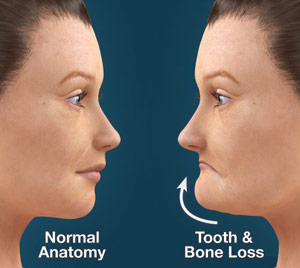
Top Reasons to Choose Dental Implants
The dental implant is today's state-of-the-art tooth replacement method. It consists of a very small titanium post (the actual implant), which is attached to a lifelike dental crown. The crown is the only part of this tooth-replacement system that is visible in your mouth. The implant itself rests beneath your gum line in the bony socket that used to hold your missing tooth. Two, four or more implants can be used to support multiple crowns, or even an entire arch of upper or lower replacement teeth. Whether you are missing one tooth, several teeth or all your teeth, dental implants...

Sleep Apnea and Behavioral Problems in Children
The number of children diagnosed with Attention Deficit Hyperactivity Disorder (ADHD) has been steadily increasing over the past decade. Yet according to a recent study, many children diagnosed with this condition don't really have it; their behavioral problems are actually related to sleep-related breathing disorders (SRBD), such as sleep apnea.
The 2012 study, published in the journal Pediatrics, followed more than 11,000 children for six years, starting when they were 6 months old. The children who had SRBD were 40 percent to 100 percent more likely than kids without breathing issues to develop behavioral problems resembling ADHD by the age...
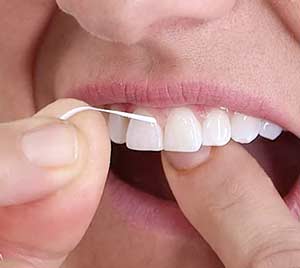
How To Floss Your Teeth
You always brush twice a day, avoid sugary snacks between meals, and go to the dentist regularly. Do you still have to floss your teeth?
The short answer: Yes, at least once a day. Flossing is probably your single most important weapon against plaque, the clingy bacterial biofilm that sticks to the surfaces of your teeth. Plaque is the principal cause of tooth decay; it is also the cause of periodontitis (gum disease), bad breath, and other maladies. Brushing is a good start — but flossing removes plaque in places a brush can't reach, like the small gaps between teeth...
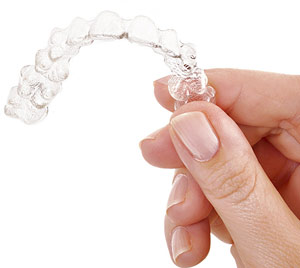
Invisalign Clear Aligners
When you hear the word “orthodontics,” what comes to mind? Probably a young teenager whose teeth are covered by a latticework of metal. There are indeed many orthodontic patients who fit that description. However, there now exists an increasingly popular alternative to traditional metal braces: Invisalign® clear aligners.
As the name implies, Invisalign clear aligners are made of almost invisible polyurethane plastic. Rather than being cemented or bonded to the teeth as metal or clear braces are, clear aligners are completely removable — for important social occasions, for eating, and, most importantly, for tooth-brushing and flossing. This advantage can also...
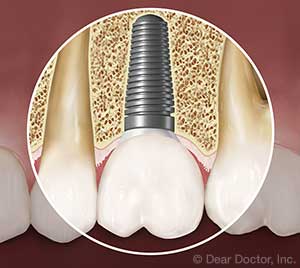
Dental Implants
Of all the ways modern dentistry has to replace missing teeth, dental implants are by far the best. There is no tooth-replacement option that will give you a longer-lasting result. Implants also help preserve tooth-supporting bone that naturally deteriorates when a tooth is lost. Loss of bone is one of the major hidden consequences of losing teeth.
A dental implant most often takes the form of a small, screw-shaped titanium post that replaces the root-part of a missing tooth. The surgical procedure used to place an implant is actually quite minor and routine, requiring only local anesthesia in most cases....
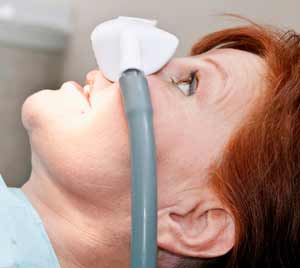
Nitrous Oxide
Some people fail to receive the benefits of dental treatment because of a simple yet seemingly overwhelming problem: Fear. It isn't uncommon to have a little anxiety about an upcoming dental procedure. But if your fears have kept you away from the dental office when you know you really should go — take heart! Conscious sedation with nitrous oxide can help you lose that anxiety, and make the whole experience so stress-free that you may not even remember it when it's over.
Nitrous oxide, a colorless gas with a slightly sweet odor, has been used in medicine for about a...

Root Canal Surgery (Apicoectomy)
Occasionally, root canal treatment proves unsuccessful at resolving an infection in the tissues near a tooth's roots. That's when a minor surgical procedure called an apicoectomy may be recommended. Because this procedure is often performed with the aid of a microscope and other small specialized tools, it's considered a type of endodontic microsurgery. Probably the most common type of root canal surgery, an apicoectomy involves removing a small portion of the apex (tip) of the tooth's root, along with any surrounding hard or soft tissue that may be infected.
What would cause you to need an apicoectomy? There could be...